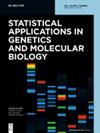GMEPS:一种在极端表型测序下进行全基因组介导分析的快速有效的可能性方法
IF 0.9
4区 数学
Q3 Mathematics
Statistical Applications in Genetics and Molecular Biology
Pub Date : 2022-01-01
DOI:10.1515/sagmb-2021-0071
引用次数: 2
摘要
极端表型测序(extreme phenotype sequencing, EPS)由于具有检测人类疾病中遗传变异关联的较高统计能力和节省成本等诸多优势,在流行病学和临床研究中,研究遗传变异与复杂表型之间的关系是一种迅速兴起的研究设计。然而,由于现有方法不能很好地适应EPS设计带来的非随机极端尾抽样过程,因此在EPS设计下,遗传变异对表型的中介效应的研究受到严格限制。在本文中,我们提出了一种可能性方法来测试遗传变异在EPS设计(GMEPS)下通过连续和二元介质对连续表型的中介效应。除了在EPS设计中实现外,还可以作为通用的中介分析程序使用。一项基于EPS设计的良性少数民族中性粒细胞减少的全基因组关联研究和一项基于随机抽样设计的镰状细胞病患者神经认知表现的候选基因研究的广泛模拟和两个实际数据应用表明,EPS设计下的GMEPS优于广泛使用的中介分析程序,同时显示了在一般随机抽样框架下的兼容能力。本文章由计算机程序翻译,如有差异,请以英文原文为准。
GMEPS: a fast and efficient likelihood approach for genome-wide mediation analysis under extreme phenotype sequencing
Abstract Due to many advantages such as higher statistical power of detecting the association of genetic variants in human disorders and cost saving, extreme phenotype sequencing (EPS) is a rapidly emerging study design in epidemiological and clinical studies investigating how genetic variations associate with complex phenotypes. However, the investigation of the mediation effect of genetic variants on phenotypes is strictly restrictive under the EPS design because existing methods cannot well accommodate the non-random extreme tails sampling process incurred by the EPS design. In this paper, we propose a likelihood approach for testing the mediation effect of genetic variants through continuous and binary mediators on a continuous phenotype under the EPS design (GMEPS). Besides implementing in EPS design, it can also be utilized as a general mediation analysis procedure. Extensive simulations and two real data applications of a genome-wide association study of benign ethnic neutropenia under EPS design and a candidate-gene study of neurocognitive performance in patients with sickle cell disease under random sampling design demonstrate the superiority of GMEPS under the EPS design over widely used mediation analysis procedures, while demonstrating compatible capabilities under the general random sampling framework.
求助全文
通过发布文献求助,成功后即可免费获取论文全文。
去求助
来源期刊
CiteScore
1.20
自引率
11.10%
发文量
8
审稿时长
6-12 weeks
期刊介绍:
Statistical Applications in Genetics and Molecular Biology seeks to publish significant research on the application of statistical ideas to problems arising from computational biology. The focus of the papers should be on the relevant statistical issues but should contain a succinct description of the relevant biological problem being considered. The range of topics is wide and will include topics such as linkage mapping, association studies, gene finding and sequence alignment, protein structure prediction, design and analysis of microarray data, molecular evolution and phylogenetic trees, DNA topology, and data base search strategies. Both original research and review articles will be warmly received.

 求助内容:
求助内容: 应助结果提醒方式:
应助结果提醒方式:


